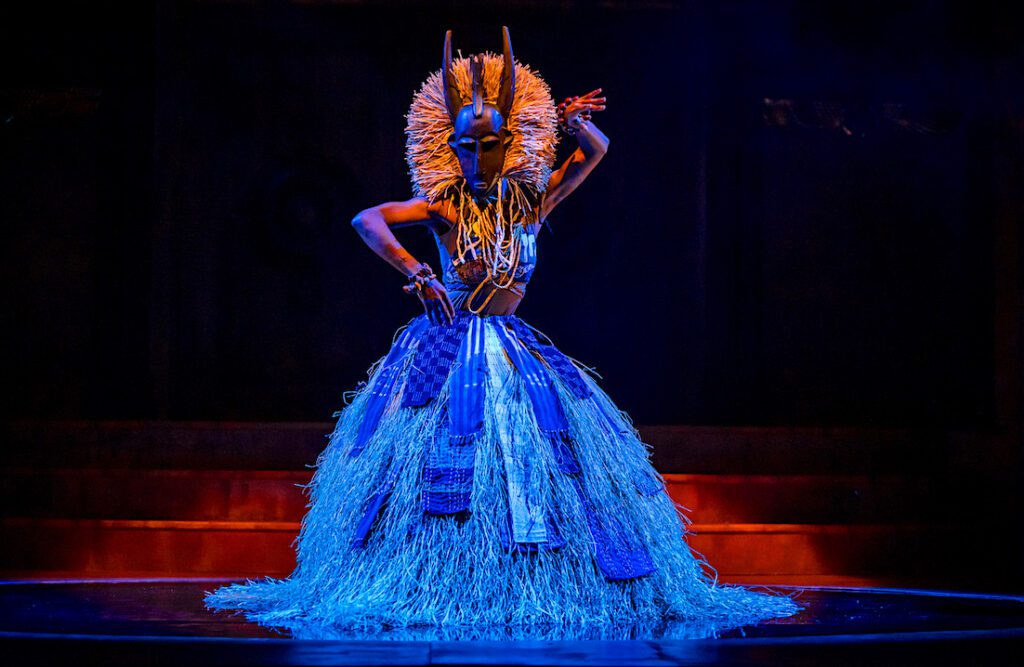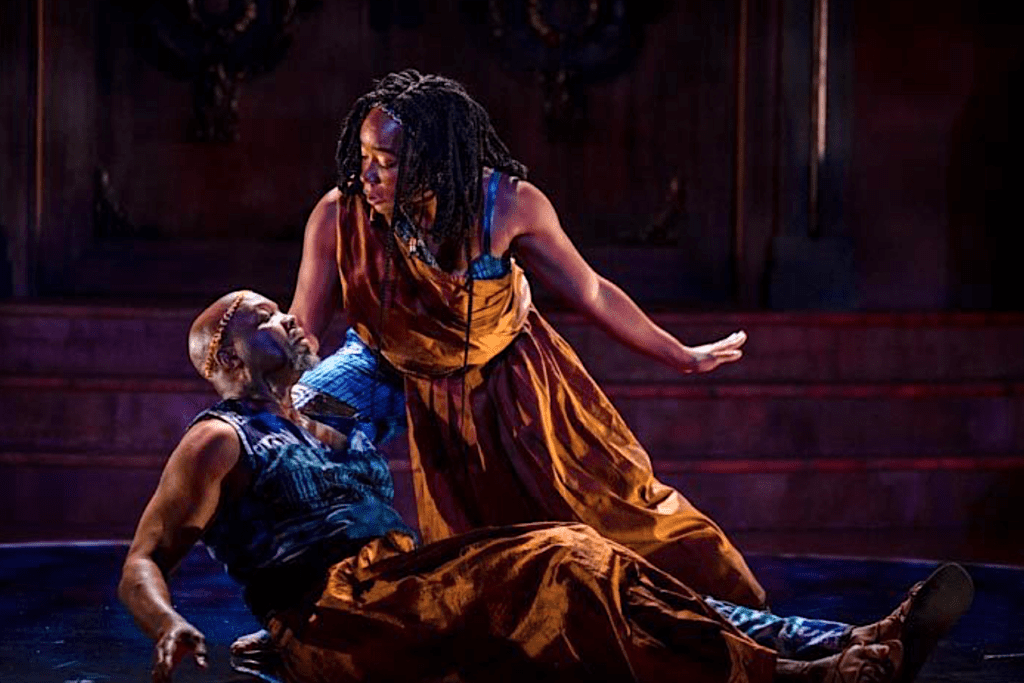Stunning ‘Metamorphoses’ Uses Vignettes of Change for Potent Storytelling
By • May 16, 2024 0 1295

By Hailey Wharram
Everything begins with a sound like maracas. A masked figure shakes her bracelets, while gliding wordlessly through the audience’s central aisle. Adorned in a magnificent straw skirt patch-worked with blue fabrics, the Water Nymph (Miss Kitty LeLynx) makes her way to the stage. Her arrival ushers in new sounds—rustling waves and rain sticks—and the rest of the cast as a joyous, dance-filled soiree springs to life.
However, this jubilee is brutally short-lived. The temperature drops and the party disbands as the ensemble links arms to brace themselves against the violent lurches of a storm-rocked ship. Soon, their huddle breaks and a spotlight begins moving across the stage like a hunter’s scope, falling upon each individual one by one. With a bone-chilling crash of the Water Nymph’s tambourine, they each crumple to the ground.
Running at Folger Theatre through June 16, Psalmayene 24’s brilliant reimagining of “Metamorphoses” balances the haunting with the humorous to create something fiercely poignant. Based on Ovid’s 15-book epic poem of the same name, this Tony award-winning play written by Mary Zimmerman delves into a myriad of iconic Greco-Roman myths centered around the motif of transformation. Furthermore, Psalmayene 24’s production features an all-Black cast—a first in Folger’s history.
Over the course of a riveting 90 minutes with no intermission, a series of vignettes divulge the tragic tales of mortals like King Midas (Jon Hudson Odom) and Eurydice (Billie Krishawn) with godly cameos from the likes of Aphrodite (Yesenia Iglesias), Bacchus (Gerrad Alex Taylor), and Zeus (DeJeanette Horne). Though the stories themselves are ancient and often laced with melancholy, contemporary musical selections and a delightfully rambunctious comedic flare give this production a refreshingly modern signature—an endlessly enjoyable style reminiscent of Folger’s production of “The Winter’s Tale” this past winter. While these plots may be grounded within a mythic past, Psalmayene 24 embeds the performance with an urgent sense of present and future.
Psalmayene 24 (also known as Gregory Morrison) is an accomplished director, actor and playwright who is currently serving as Mosaic Theater’s Andrew W. Mellon Foundation Playwright in Residence. Two of his original works include “The Blackest Battle” (Theater Alliance) and “The Freewheelin’ Insurgents” (Arena Stage). His decision to cast “Metamorphoses” with an all-Black ensemble was predominantly influenced by the killing of Tyre Nichols at the hands of the Memphis police in January 2023.
“His death shattered me,” Psalmayene 24 said. “If Mr. Nichols’ unjust and brutal killing reveals anything, it’s that the mechanisms of American power still devalue Black life. My hope is that through this interpretation of “Metamorphoses,” D. C. audiences will gain a greater awareness and appreciation of the universal commonalities that bind us all.”
During Zimmerman’s original Broadway run in 2002, the production was anchored by a central set piece: a large pool in the center of the stage meant to embody the mutability these stories embrace. However, on the heels of Folger’s 4-year-long, $80.5 million renovations, the artistic team collaboratively concluded that incorporating this production element was ultimately unwise. However, this change in direction did not break Psalmayene 24’s stride in the slightest.
“I became almost giddy about it,” he reveals in his director’s note. “As brilliant as the pool conceit is, I was excited to explore how this robust script could support an alternative interpretation that didn’t include literal water on stage.”
Even without the grandeur of a central pool, “Metamorphoses” is still a visual feast, thanks in large part to the breathtaking costume design of Mika Eubanks. From Midas’s velvet, greed-green suit jacket to Bacchus’s sparkly boas to the Water Nymph’s stunning periwinkle crochet top—complete with flowing fringe which she plucks like a lyre in coordination with a soft string backing track—every performer is outfitted in marvelous costumes which seamlessly align with the quality of their performances.
While each of these stories grapple with drastic physical and emotional transformations, ultimately, their resonant depictions of the human condition demonstrate that, even thousands of years after Ovid penned “Metamorphoses” in 8 A.D., the core hallmarks of life on Earth remain universal and unchanging.
“ ‘Metamorphoses’ is a magnificent play that allows audiences to see a vast and splendid spectrum of human behavior,” Psalmayene 24 writes in his director’s note. “Zimmerman not only gives us a greatest hits of myths in this play, but she gifts us with a mirror that reflects the gorgeous and gruesome face of humanity.”
In acknowledging the beauty of the source material’s universality, Folger’s production of “Metamorphoses” continues to prioritize uplifting the Black community.
“This production is a ritual meant to celebrate and elevate Black humanity while connecting us to all humanity,” Psalmayene 24 said.
Two Relaxed Performances “designed to create a welcoming and comfortable environment for neuro-diverse audiences” will be performed on Sunday, May 26 at 7:30 p.m. and on Wednesday, June 5 at 2 p.m. Directly following the performance beginning at 7:30 p.m. on Thursday, May 30, there will be a Post-Show Discussion with the cast. Two Open-Captioned performances will occur on Sunday, June 9 at 2 p.m. and 7:30 p.m.
Tickets for “Metamorphoses” at Folger Theatre — located at the Folger Shakespeare Library, 201 E Capitol St. SE — can be purchased here.

DeJeanette Horne and Renee Elizabeth Wilson in “Metamorphoses” as Ceyx and Alcyone. Photo by Brittany Diliberto.

